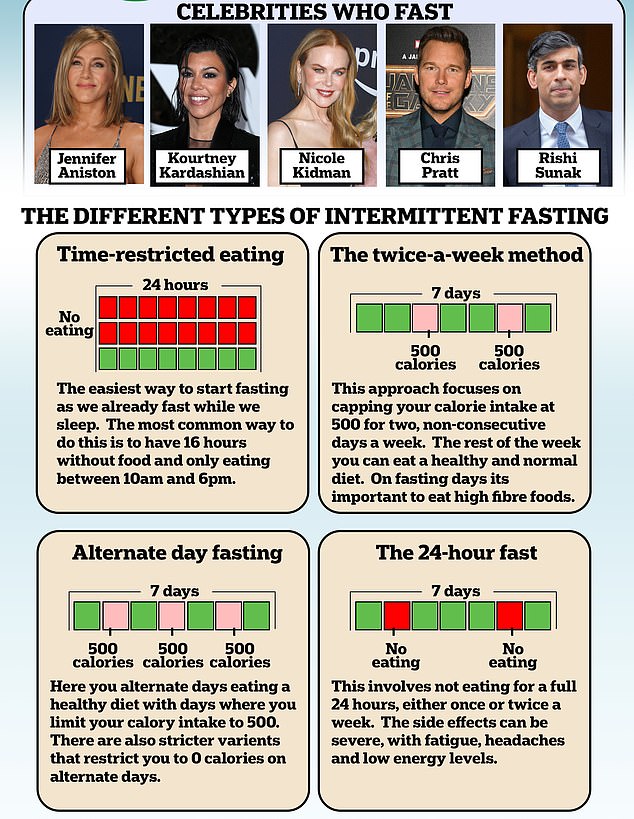5:2 diet championed by The Daily Mail’s Dr Michael Mosley – and favoured by politicians and celebrities – works better than drugs for type 2 diabetes, study suggests
The 5:2 diet, made famous by TV diet guru and Daily Mail columnist Dr Michael Mosley, produces better results for type 2 diabetes patients than medication, a study suggests.
The beloved doctor and author, who died earlier this month in the seaside resort of Agia Marina in Crete, was best known for his revolutionary weight-loss plan, which involved fasting two days a week and eating a balanced diet the rest of the time.
Politicians including former chancellor George Osborne and Rishi Sunak are said to have tried fasting.
And Jennifer Aniston, Chris Pratt and Kourtney Kardashian are among the Hollywood A-listers who have jumped on the diet trend since it broke in early 2010.
A clinical trial in overweight and obese adults with type 2 diabetes found that this approach can improve blood sugar control and boost weight loss more than taking common medications for the condition.
The 5:2 diet, made famous by TV diet guru and Mail columnist Dr. Michael Mosley, produces better results for type 2 diabetes patients than medication, a study suggests

Dr. Mosley, who died earlier this month in the seaside resort of Agia Marina in Crete, was best known for his revolutionary weight-loss plan, which involved fasting two days a week and eating a balanced diet the rest of the time. Pictured with his wife, Doctor Clare Bailey

Politicians, including former Chancellor George Osborne and Rishi Sunak, are said to have tried forms of fasting diets. And Jennifer Aniston, Chris Pratt and Kourtney Kardashian are among the Hollywood A-listers who have jumped on the fasting trend since it emerged in early 2010.
A team led by scientists from Beijing Hospital in China recruited more than 400 patients who were divided into three groups.
One was given the diabetes drug metformin, one was given another diabetes drug called empagliflozin, and another was given a 5:2 diet.
Participants in the 5:2 group consumed a low-energy replacement meal two days per week, with a daily intake of 500 calories for women and 600 calories for men.
On the remaining five days, they chose their own breakfast and lunch, but were given a low-calorie meal replacement for dinner.
They were also encouraged to monitor their caloric intake during the treatment period.
Analysis showed that those in the 5:2 group achieved better blood glucose levels after 16 weeks compared to those taking either drug.
This group also achieved the greatest weight loss of 9.7 kg compared to 5.5 kg for the metformin group and 5.8 kg for the empagliflozin group.
The researchers wrote in the journal Jama Network Open: ‘The 5:2 meal replacement approach may serve as an effective initial lifestyle intervention in place of antidiabetic agents for patients with type 2 diabetes.’

Analysis showed that those in the 5:2 group achieved better blood glucose levels after 16 weeks compared to those taking either drug.

Jennifer Aniston is one of the Hollywood stars who have jumped on the diet trend since it came to prominence in the early 2010s. Here she is pictured in Los Angeles in 2020
Dr. Mosley was first introduced to the 5:2 diet through a 2011 study, and it became the backbone of his 2013 book, The Fast Diet.
On the diet’s website, Dr Mosley said those who follow the diet can expect to lose around 0.5kg per week and enjoy health benefits such as improvements in blood pressure and cholesterol levels to better insulin sensitivity.
The health guru even found personal success with the 5:2 diet when he reversed his type 2 diabetes.
Commenting on the study, Naveed Sattar, professor of cardiometabolic medicine at the University of Glasgow, said: ‘This trial is relatively simple and shows what we already know: that obesity is the main cause of diabetes and that weight loss therefore affects glucose levels in a meaningful way. improves.
‘The question is whether such changes and the 5:2 diets are sustainable, especially as the trial was quite short-lived… with greater than expected weight loss in all three arms.’
Figures show that around 3 million patients were prescribed medicines to treat diabetes in England in 2020/2021.
